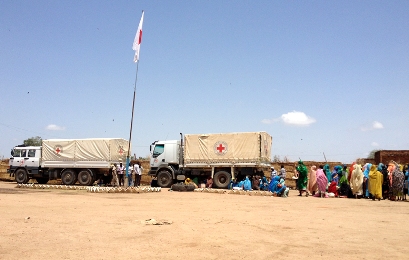Sudan did not suspend Red Cross, says official
March 25, 2014 (KHARTOUM) – Sudan’s commissioner of humanitarian aid, Suleiman Abdel-Rahman, has accused the International Committee of the Red Cross (ICRC) of obscuring the government’s measures which were applied against it recently.

He stressed that Sudanese authorities did not suspend ICRC activities even for a single hour, announcing that consultations to adjust its positions are underway with its officials who arrived in Khartoum last week.
The Sudanese official said he expects that ICRC would be able to carry out its normal activities after signing the amended agreement.
Last February, the Sudanese government suspended the work of the ICRC saying that the latter needs to comply with the humanitarian work guidelines and the voluntary work law in order to continue its activities in the country.
A spokesman for the organization’s office in Khartoum at the time said that Humanitarian Aid Commission (HAC) sent them a letter asking them to suspend their activities until they comply with certain conditions.
He said that among these stipulations is placing the ICRC budget and funds at the disposal of the Sudanese Red Crescent and not to undertake any activity on the ground before informing Sudanese authorities about its nature and timing.
The ICRC began working in Sudan in 1978 according to its website. The organization says it is helping people affected by the conflict in Darfur, providing seed, tools, food and water and re-establishing contact between people separated by the fighting.
The ICRC also promotes international humanitarian law and the protection of civilians affected by the conflict.
In a related context, Abdel-Rahman noted the number of IDPs who fled the recent military escalation in North Darfur state reached 101,141, stressing that 6,000 of them have voluntarily returned to their villages.
He affirmed there is currently 63 foreign aid groups operating in Darfur compared to 208 groups in 2006, attributing it to the improvement of humanitarian situation in the region.
Abdel-Rahman pointed to presidential directives to reconstruct what war has destroyed in North Darfur state particularly service institutions.
In a separate issue, the commissioner underscored adherence to the tripartite initiative between Sudan’s government, United Nations, and the Arab League to deliver humanitarian assistance to areas controlled by the SPLM-N.
He criticized the SPLM-N rejection of the initiative, pointing the latter signed the tripartite initiative prior to the government signing.
Abdel-Rahman noted that the UN delegation which recently visited Khartoum had assessed the situation at Atash camp for IDPs, saying the visit promotes trust, coordination, and cooperation with various UN agencies.
He said the UN delegation hailed government efforts to secure humanitarian work, noting that Khartoum awaits completion of the peace process to deliver aid to areas controlled by the SPLM-N in South Kordofan and Blue Nile.
Meanwhile, the director of organizations at HAC, Ali Adam, denied banning the French aid group Agency for Technical Cooperation and Development (ACTED), saying HAC’s technical team in Central Darfur state had assessed performance of the latter group against its 2012 and 2013 against its large budgets and the state’s government decided to stop its activities due to poor impact of its projects.
Immediately after the first arrest warrant of the International Criminal Court (ICC) against Sudan’s president Omer Al-Bashir in March 2009, Sudan expelled 13 aid groups from Darfur accusing it of collaborating with the war crime courts.
Since then, the activities of foreign aid group in Darfur are strictly controlled and more organizations were evicted through the years.
Sudan refuses to allow new aid groups to work in the region.
The government also banned the access of foreign groups to the rebel-held areas in South Kordofan and Blue Nile as well as the establishment of camps for the displaced civilians, stressing the experience of Darfur camps should not be repeated in the two states.
(ST)
